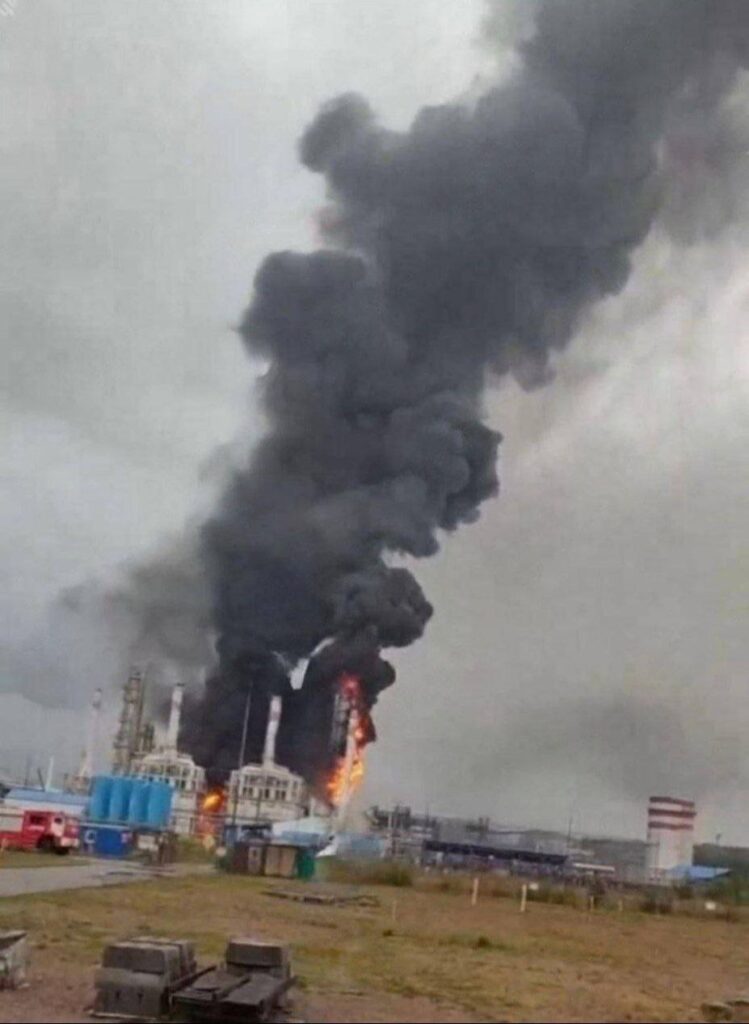Ukrainian drones strike Russian port and oil refinery in coordinated attack on war-funding infrastructure [updated]

Ukrainian forces launched a coordinated drone assault on Russian territory overnight, targeting critical infrastructure including the Ust-Luga port in Leningrad Oblast and the Syzran oil refinery in Samara Oblast, according to regional governors.
The targeted Ust-Luga port terminal handles fuel that can be utilized by Russian military forces, while oil refineries like the one in Syzran provide petroleum products crucial for sustaining military operations. Oil refineries supply fuel for Russian tanks, artillery, and transport vehicles, thereby directly impacting war capabilities.
By disrupting these economic assets, Ukrainian forces aim to undermine the financial resources funding Russia’s ongoing military campaign.
Strategic port generating war funding revenue comes under attack
Leningrad Oblast Governor Alexander Drozdenko confirmed that air defenses allegedly destroyed 10 drones over the Ust-Luga port facility, located around 2000 km away from Kyiv, on the morning of 24 August.
This port serves as a crucial hub for Russia to bypass Western sanctions while exporting oil, gas, and coal that generate revenue for military operations.
The attack resulted in debris causing a fire at a NOVATEK terminal, with Drozdenko stating that “firefighters and emergency services are working to extinguish the fire.”
A specialized fire train carrying over 183 tons of water and 5 tons of foam concentrate was dispatched to assist in firefighting operations, according to the October Railway company.
The Ust-Luga port in Russia's Leningrad Oblast came under drone assault on the morning of 24 August.
— Euromaidan Press (@EuromaidanPress) August 24, 2025
This port processes fuel used by Russian military forces.
It serves as a crucial hub for Russia to bypass Western sanctions while exporting oil, gas, and coal that generate… pic.twitter.com/H0mEc1ZwFt
Oil refinery producing resources for Russian war effort faces repeated strikes
The Syzran oil refinery in Samara Oblast, over 1700 km away from Kyiv, came under drone attack, with local residents reporting approximately 20 explosions throughout the night.
Samara Governor Vyacheslav Fedorishchev acknowledged the strike on what he termed “an industrial enterprise facility.”
This marks the fourth attack on the Syzran refinery in 2025, following previous strikes in February, March, and earlier in August.
Overnight, drones struck the Syzran oil refinery in Russia's Samara Oblast, located almost 2000 km away from Kyiv.
— Euromaidan Press (@EuromaidanPress) August 24, 2025
Local residents reported about 20 explosions throughout the night.
Ukraine targets Russian oil refineries to disrupt the supply of fuel for military operations and… pic.twitter.com/F9oiTKfgHP
Drone attack affects civilian flights
The overnight attacks caused significant disruptions to civilian air traffic, with Pulkovo airport in St. Petersburg suspending aircraft operations.
The airport operated under imposed restrictions for approximately 18 hours, resulting in dozens of delayed flights and passengers sleeping on mats in terminal areas, according to the facility’s press service.
The Russian Defense Ministry subsequently reported that air defense systems intercepted and destroyed 95 Ukrainian drones across 12 Russian regions, Tatarstan, and occupied Crimea during the night. Regional authorities reported no casualties from the attacks on both targeted facilities.
[Update as of 11 p.m. on 24 August]
The Ukrainian General Staff officially confirmed the coordinated attack on Ust-Luga port and the Syzran oil refinery.
The targeted Syzran refinery has a design capacity of 8.5 million tons of oil annually, representing approximately 3.08% of Russia’s total oil refining volume, and specializes in producing gasoline, diesel fuel, and aviation kerosene supplied directly to Russian occupying forces.
Ukrainian forces also struck a gas condensate fractionation and transshipment unit at the Ust-Luga marine terminal with a capacity of 6.9 million tons of raw materials per year.
The General Staff confirmed that Ust-Luga serves as “one of Russia’s key logistics hubs in the Baltic Sea, actively used for exporting energy resources using the so-called shadow fleet to bypass international sanctions.”